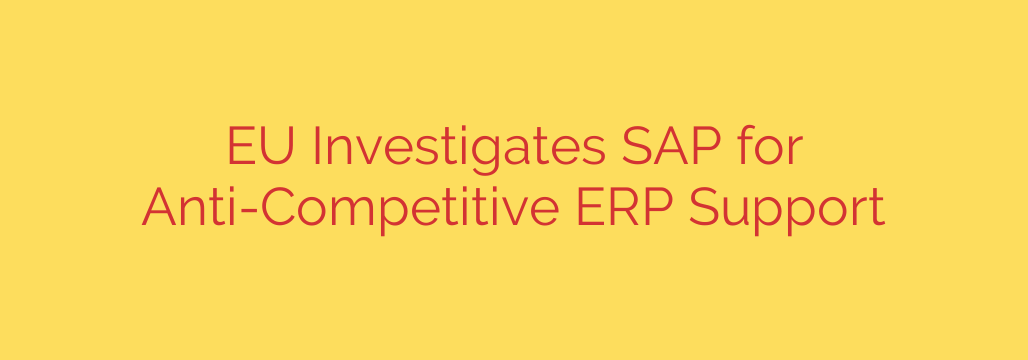
EU Launches Antitrust Probe into SAP’s ERP Support Practices
The European Commission has officially opened an investigation into SAP, the global enterprise software giant, over allegations of anti-competitive behavior in its Enterprise Resource Planning (ERP) support and maintenance services. This move places SAP’s long-standing business model under intense regulatory scrutiny and could have significant implications for thousands of businesses that rely on its software.
The investigation centers on claims that SAP is leveraging its dominant market position to unfairly disadvantage third-party support providers and lock customers into its own ecosystem. For years, companies have voiced concerns about the high cost and rigid nature of SAP’s maintenance contracts, and this probe signals that regulators are now taking these complaints seriously.
Understanding the Allegations: A Closer Look at ERP Support
At the heart of the issue is the concept of vendor lock-in. Many organizations that have invested heavily in SAP’s ERP systems find it prohibitively difficult and expensive to switch to another provider. This dependency gives SAP considerable power over its customer base, particularly when it comes to ongoing support and maintenance—a highly profitable segment of its business.
The core allegations suggest that SAP engages in several practices designed to stifle competition from third-party maintenance (TPM) providers. These alternative providers often offer similar support services at a fraction of the cost, giving customers more flexibility and control over their IT budgets. The investigation will examine whether SAP’s actions illegally prevent customers from exercising this choice.
Tactics Under Scrutiny
The probe is expected to focus on specific strategies allegedly used by SAP to maintain its grip on the support market. These include:
- Bundling Services: Tying essential software updates, security patches, and product innovations exclusively to its own expensive support contracts. This forces customers who want to keep their systems secure and up-to-date to stick with SAP’s maintenance plan, even if a third party offers better value for basic support.
- Creating Technical Barriers: Making it technically complex for customers to decouple support from other services. This can involve restricting access to necessary code, patches, or compatibility information that third-party providers need to effectively service the software.
- Complex Licensing and Audits: Using intricate licensing agreements and the threat of software audits to discourage customers from exploring alternative support options. Fear, uncertainty, and doubt can be powerful tools in preventing customers from switching providers.
- Restricting Interoperability: Limiting how SAP products can integrate with other systems or services if the customer is not subscribed to its official maintenance plan, effectively punishing them for seeking alternatives.
What This Investigation Means for SAP Customers
This investigation is more than just a legal battle between corporations; it has direct consequences for any business running on SAP software. The outcome could reshape the ERP support landscape, potentially leading to a more competitive and customer-friendly market.
For customers, the key impacts of SAP’s alleged practices have been:
- Inflated Maintenance Costs: Businesses are often forced to pay support fees that can reach 22% of the original license cost annually, regardless of whether they need the full scope of services offered.
- Limited Flexibility: The all-or-nothing approach to support prevents companies from tailoring a maintenance plan to their specific needs, often forcing them to pay for services (like new software versions) they have no intention of using.
- Forced Migrations: The pressure to stay on SAP’s official support is often used as leverage to push customers toward newer, more expensive products like S/4HANA, even if their current systems are stable and meet their business requirements.
Actionable Advice for Businesses Using SAP
While the EU investigation unfolds, businesses are not powerless. This is an opportune moment to re-evaluate your organization’s SAP strategy.
- Thoroughly Review Your SAP Contract: Understand the specific terms, conditions, and exit clauses related to your support and maintenance agreement. Pay close attention to any language that restricts your ability to use third-party services.
- Assess Your Actual Support Needs: Conduct an internal audit to determine what level of support your organization truly requires. Do you rely on SAP for constant innovation and version upgrades, or do you primarily need reliable support for a stable, existing system?
- Explore Third-Party Maintenance (TPM) Options: Research reputable TPM providers to understand the potential cost savings and service benefits. Many offer high-quality support for a fraction of the cost, allowing you to reallocate IT funds to more strategic innovation projects.
- Stay Informed on the Investigation: The progress of the EU probe could create new opportunities and strengthen your negotiating position with SAP. Keep a close eye on regulatory announcements and industry news.
The European Commission’s investigation marks a critical turning point. If regulators find that SAP has engaged in anti-competitive practices, it could lead to substantial fines and force the company to change its business model. For customers, this could finally level the playing field, ushering in an era of greater choice, lower costs, and increased flexibility in the ERP support market.
Source: https://www.bleepingcomputer.com/news/legal/eu-probes-sap-over-anti-competitive-erp-support-practices/








